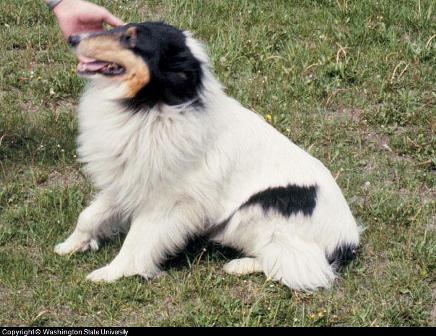Heart and Blood: Blood Disorders
Heart and Blood QuickLinks
Different types of Canine Blood Disorders:
In general, canine blood disorders are defined by two forms, genetically occurring or congenital and the other is acquired or caused by some pathological factor such as viruses, tumors, bacteria or poisoning etc. Canine blood has many parts with all functions of a dog’s body dependent upon these vascular components, i.e. parts of blood like blood cells, plasma and platelets. Deficiency or a defect in any component may lead to any form of dog blood disorder, which sometimes are of serious concern.
Some common types of dog blood disorders are described below:
Anemia; Anemia in dogs is the most common canine blood disorder. It refers to the reduced circulation of whole blood or any part of the blood (usually Blood cells) depending upon the cause of the condition. Parasitic infestations, infections, and a defect in how how blood cells are formed are all different causes of anemia. Dog anemia may be classified as being either regenerative or non-regenerative.
Regenerative anemia is caused by excessive bleeding as what happens due to injuries or trauma, and massive destruction of blood tissues or hemolysis due to any infection. This type is recoverable, either from the body reproducing blood cells on its own or from a deficiency that can be resolved with a few transfusions of whole blood and sometimes parts of blood.
Non-regenerative canine anemia on the other hand is a permanent defect in the formation of blood cells; it may be either caused by severe damage to blood producing cells or due to cancers, defects of bone marrow or congenital problems like those that occur in spaniels. This type is usually incurable or too expensive to treat, thus prognosis for such type is always declared “Grave”.- Coagulation Disorder; Dog
coagulation blood disorders may be congenital or acquired.
Puppies born with this coagulation blood defect is due to deficiencies in different coagulation factors or proteins such as factor II (Abnormal Thrombin), factor VII (Post Partum Hemorrhage), factor VIII, IX (Prolonged Bleeding) and factor XII (Fetal Thrombosis). Most of puppies die soon after birth or may suffer a life long problem of prolonged bleeding and severe anemia if injured or suffering from trauma. Dogs may acquire a major coagulation problem if the dog accidentally ingests anti-coagulant rodenticides . Rodenticides prevent the functioning of vitamin K, thus deactivating different coagulant factors, leaving the dog with severe blood coagulation disorder.Some viral and bacterial toxins, burns, heat strokes and tumors can cause a vascular disorder that can result in a type of coagulation disorder.
- Platelet Protein and Function Disorder;
These dog blood disorders are also congenital or acquired.
“Canine Thrombocytopenia”, is one such example, in which the body fails
to
produce adequate numbers of thrombocytes or platelets. This either
occurs congenitally or is caused by “Ehrlichial disease”, which is an
caused by Ehrlichial canis (ticks). It is also one of the side effects
of drugs as
such as chloramphenicol, sulfanomides or estrogen or is caused by
vaccinating puppies with live adenovirus or paramyxo virus repeatedly.
The congenital form is usually incurable. When treating infection, discontinuing causative drugs or accurately following the vaccination schedule can help to prevent platelet disorders.
Common canine blood disorders related to platelets include defects in the capacity of platelet functionality. “Von Willbrand’s disease” in dogs and “Canine thrombopathia” are some common examples, where continuous bleeding is noted as a result of the reduced functioning of platelets or thrombocytes.
- Vascular Disorders; Dog vascular disorders are deficiencies of collagen protein in blood. It is most commonly noted in “Rocky Mountain Spotted fever”, which is caused by Rickettsia rickettsii, which is transmitted by ticks, and in “Canine Herpes virus” infection. Dogs may experience blood disorders related to cellular strength even after recovery.
- Leukopenia and Leukocytosis;
Leukopenia is reduced and leukocytosis is the increased number of white
blood cells (WBC) in circulation. Both of these conditions are noted in
several infections, toxins of bacteria and virions of viruses, which
usually triggers an immune response. This either causes a
decrease or
increase in the white blood population in circulation fluids, depending
upon the level of immune response.

A Collie dog with cyclic neutropenia which is an abnormal decrease in the number of neutrophils in the blood, a condition seen in certain leukemias and anemias
Source: Washington State University - Cancer; In recent years, some
malignant tumors
or cancerous developments have been included as important canine blood
disorders. These tumors mostly are associated with the RBC (red blood
cell)
and WBC (white blood cell) content in blood, canine malignant
lymphomas, hematopoeitc sarcomas and
cancers of bone marrow are some examples.
Chemotherapy, repeated transfusions and radioactive therapy are the only possible way to address cancers, but in most cases, outcomes of any approach taken usually fail.
Signs of Blood Disorders:
Any dog showing signs such as prolonged bleeding, intolerance to minor injuries, pale gums, lethargy, progressive weakness and dog blood in the urine or dog blood in the stool may indicate any of the forms of canine blood disorders described on this page. Veterinarians should be consulted without any delay for further diagnosis and treatment.
Diagnosis and Treatment:
Thorough hematology and different procedures such as the determination of the blood cell count, PCV (packed red cell volume in the blood), detection of different proteins and factors may be required to diagnose any blood disorder.
Treatment usually depends upon making a confirmatory diagnosis. Symptomatic treatment is never sufficient to treat canine blood disorders, except in regenerative anemia. Treatment of canine blood disorders in most cases, is not only hard in terms of ensuring a complete recovery, but also is too expensive to continue for long periods of time.
|
|